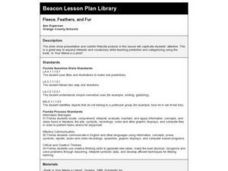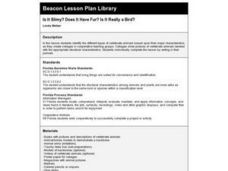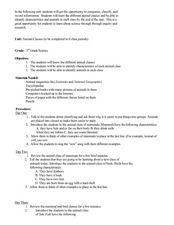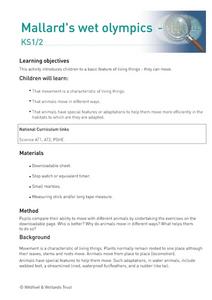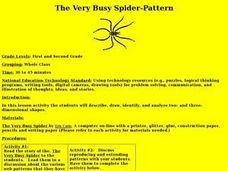Curated OER
Fin, Feathers, or Fur?
Students learn how to classify animals. In this animal characteristics lesson, students read Granddad's Animal Alphabet Book, brainstorm a list of different kinds of animals, and determine their characteristics; fur, feathers or scales....
Twisty Noodle
Fur, Features, Scales, and Shells Book
What's the difference between a bear and a fish? Examine the characteristics of different animals with a set of pages for kids to color. Four pages provide different animals for each characteristic, including turtles, bears, fish, and...
Curated OER
Fleece, Feathers, and Fur
Students improve vocabulary and explore predicting and categorizing after reading the book, Is Your Mama a Llama?
Curated OER
EEEK! A Spider!
Youngsters complete a unit of lessons based on the story "Little Miss Muffet." They predict what will happen in the story, and use context clues to look for meaning in the words. They research information about spiders using the Internet...
Curated OER
Animal Body Coverings
First graders compare and contrast animals according to their various body coverings, (fur, scales, shells). Students discuss the different body coverings they have seen on animals. They conduct a sensory experiment in which they feel...
Curated OER
Is It Slimy? Does It Have Fur? Is It Really a Bird?
Sixth graders identify the different types of vertebrate animals based upon their major characteristics, as they create collages in groups. Collages show pictures of vertebrate animals labeled with the appropriate structural...
Curated OER
Farm Animal Coverings
Students inquire about the different coverings that farm animals have. They identify feathers, hair and fur. They categorize animals into either farm animals or zoo animals. They gather pictures of various domestic and wild animals from...
Curated OER
Animal Classes
Third graders research animals through books and magazines and put them into their various classes. In this animal classes lesson plan, 3rd graders describe the characteristics of animals in each class.
Curated OER
Animals
Learners research and study animals. In this animals lesson, students draw pictures of animal movements and create animals books. This activity is meant to be a culminating activity for a unit on animals.
Curated OER
Baa, Ram, Ewe.... Sheep Tales
Pupils explore animal characteristics by reading animal stories in class. In this sheep habitat lesson, students identify the uses for sheep in our agricultural based society and the importance of wool in our economy. Pupils read several...
Curated OER
Look Alikes
Third graders compare and contrast the physical features of parents and offspring. In this life science lesson, 3rd graders classify a set of animal pictures according to their similarities. They share and explain their work in class.
Brooklyn Children’s Museum
Inside India
What can a Ganesh statue, hand ornament, and print block tell you about India? Introduce your learners to the geography, history, and culture of India by analyzing primary sources and using the well-designed worksheets provided in this...
Curated OER
Mallard's Wetland Olympics
Students observe plants and animals of a wetland and then compare their ability to move with different animals by undertaking the exercises on a downloadable page.
Curated OER
Animal Coverings
Summary: Categorize animal pictures by their coverings. Show photographs of animals. Ask students to give descriptive words as to how they think the animal's covering would feel if they could actually touch it.
Curated OER
Animal Coverings
Students categorize animals by their coverings. They list descriptive words, explore a science center with actual animal coverings, match pictures of animals with coverings, and categorize pictures of animals by their coverings on a...
Curated OER
Oh No! Oil Spills
Students discover the threats of an oil spill. In this ecological awareness lesson, students examine the effects of oil spills on animals and our oceans. Students get simulated oil on themselves and discover ways to clean it up.
Curated OER
Animals
Students demonstrate and understanding of animal coverings and types of movement through drawings, making of booklets and categorization activities.
Curated OER
Animal Signs
Students discuss the many different types of animal signs that can be used to identify and track animals. They participate in an hands-on activity in which they examine tracks, trails, homes, territory markings, and even "scat" left by...
Curated OER
The Great Horned Owl
In this recognizing facts about the Great Horned Owl worksheet, students read fun facts, match illustrations with adaptations, sequence life cycle cards, and read what to do if they find an injured bird. Students solve 16 answers.
Curated OER
Weather and Seasons: Mt. Seymour Winter Fieldtrip
Learners explore winter adaptations and glare. In this winter weather lesson, students discuss the season of winter and how animals and plants adapt to the changing weather. Learners discuss the glare off snow and make goggles for their...
Curated OER
Gargoyles
Pupils design gargoyles modeled after the ones seen on Gothic cathedrals. They research the function and significance of gargoyles.
Curated OER
Penguins, Penguins, Penguins
Learners create "juice bottle penguins" using paper mache, water-based paints, water, and recycled juice bottles. This lesson is intended for early-elementary students and is great as a post-activity for a lesson or unit on Penguins or...
Curated OER
The Very Busy Spider-Pattern
Students explore two- and three-dimensional shapes. In this very busy spider lesson, students read the story and then create a spider web pattern of their own. The webs must use a symmetrical pattern. Additional activities...


